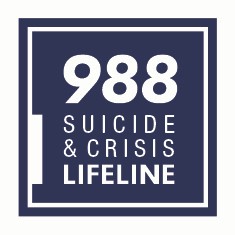TDMHSAS Celebrates Successful Launch of 988 Suicide and Crisis Lifeline
Six months of data show significant increase in outreach for help
NASHVILLE, Tenn.—The Tennessee Department of Mental Health and Substance Abuse Services (TDMHSAS) is releasing new data showing the response to the 988 Suicide and Crisis Lifeline in the state.
The three-digit number for the Suicide and Crisis Lifeline launched in mid-July 2022 after two years of planning, preparation, and expansion. In Tennessee, that included distributing about $2.8 million in federal funding to community-based crisis call centers to hire dozens of new staff.
The preparation paid off with about 21,000 Tennessee calls to 988 in the last six months of 2022. That’s an increase of about 500 calls per month over the previous 10-digit National Suicide Prevention Lifeline number. Tennesseans are also taking advantage of 988’s ability to text or chat. In the last half of 2022, there were nearly 10,000 texts to 988 and chats with 988lifeline.org from people in Tennessee.
“It’s never been easier to connect with mental health care in a crisis thanks to 988. Our state has an amazing network of crisis services and community mental health providers, and 988 is unlocking the door to mental health help that so many people need right now,” said TDMHSAS Commissioner Marie Williams. “We are grateful to our community partners who expanded to meet the demand and continue to respond to needs in a caring and compassionate way.”
Even with the increased demand for assistance, Tennessee’s crisis call centers are meeting or exceeding national benchmarks for in-state answer rate and time to answer. The federal agency that funds the 988 Suicide and Crisis Lifeline sets targets at 90% in-state and 30 seconds. Any call that’s not answered promptly in-state rolls over to a national backup call center so that no call goes unanswered.
“The power of 988 and Tennessee’s crisis services continuum means that not only are you talking to someone in Tennessee, the call-taker is probably in your region and knows the resources and probably has personal contacts who can help,” said TDMHSAS Director of Crisis Services and Suicide Prevention Jennifer Armstrong.
After the strong start in 2022, TDMHSAS is adding additional capacity in Nashville, Knoxville, and West Tennessee utilizing $1 million in supplemental funding from the Substance Abuse and Mental Health Services Administration and existing Mental Health Block Grant Funding. The department previously expanded chat and text capabilities in September 2022 to meet the demand during peak times.
“We’ve long said that we were going to follow the data in our approach to 988, and we’ve done just that. We’re constantly learning more about how Tennesseans want to access help in a mental health crisis, and increasingly that doesn’t involve speaking to someone on the phone.,” said Matt Yancey, LCSW, TDMHSAS Deputy Commissioner for Community Behavioral Health Programs. “We’re grateful for the flexibility of our crisis call centers and their amazing staff as we work together to meet the need and connect people to care.”
Watch a video that explains how 988 fits into Tennessee's Crisis Continuum
The 988 Suicide and Crisis Lifeline is intended for people experiencing a mental health crisis or thoughts of suicide. These situations or feelings can be caused by any number things from stress at school or work to feelings of depression or problems with substance use. 988 Crisis Providers are caring and compassionate, trained professionals who want to help and have the resources to make a difference. It's important to note that anyone can reach out to 988 and remain completely anonymous, and people can access 988 services without sharing their location.
Since the launch of 988, only about 3% percent of calls have resulted in law enforcement interactions. For comparison, that rate is the same as under the previous National Suicide Prevention Lifeline. The largest number of people who reach out (42%) just want to talk to someone about what they’re going through. Non-emergency mental health referrals (30%), non-mental health community referrals (11%), and coordination of care (10%) make up the next largest segment of outcomes. For the remainder, small percentages receive either a face-to-face mobile crisis evaluation (4%) or a referral to a hospital emergency department for medical treatment (2%).
For more information about 988 in Tennessee, visit: TN.gov/988